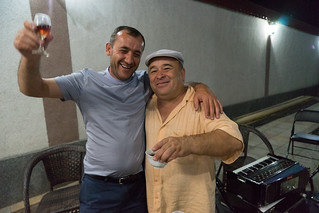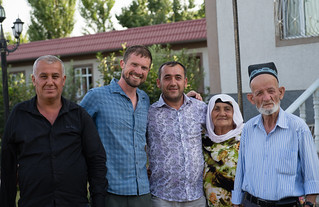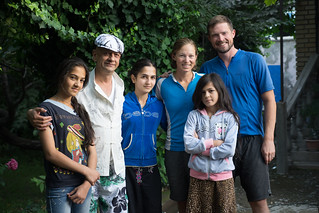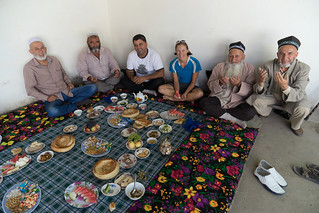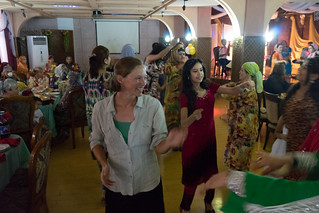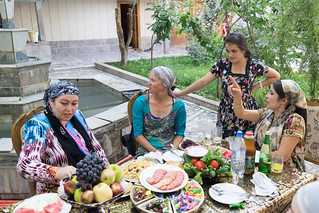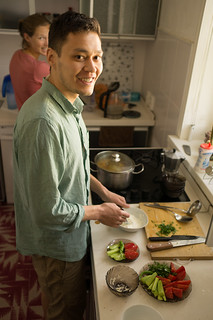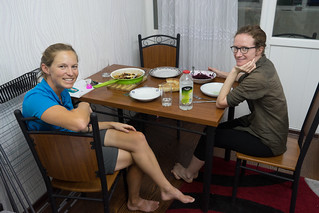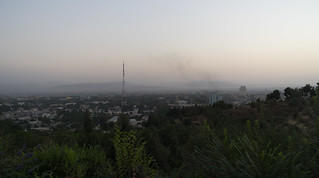After all the stress about getting out of Uzbekistan, we were relieved to finally be in Tajikistan. We crossed the border in the mid-afternoon and rode until early evening, when we found ourselves in a small town just before sunset. We stopped at a gas station to get water, and realized that we wouldn’t be able to get out of town to a place where we could camp before dark. The station manager spoke a little English, so we asked him if there was somewhere nearby where we could put our tent. He gestured vaguely up the road and we were about to go try our luck when a middle aged man in white leather dress shoes, stylized jeans, and snappy suspenders over a white shirt, topped off with sunglasses pushed up on his forehead under a white golf cap, bounded out of the station’s mini market. “Hello!” He boomed! “I am Rustam! You need help?!” His English didn’t go much farther than that, but in under a minute he scoffed at our camping plans and said the magic words: “My dom, sleep. Come.” The manager supported this plan and pointed to a nearby radio tower. “He lives right there. 500 meters away.” So we hopped on our bikes and followed the white Land Cruiser down the torn up street and into a nearby neighborhood.
Every once in a while the car would stop and one of the men inside would lean out and holler enthusiastically in Russian. We turned onto smaller and smaller streets and at one point were stopped by a little boy waving a toy gun. Rustam’s sidekick – Oskar – jumped out of the car and showered the boy with kisses. “My son, Hassan,” he said in Russian. He picked Hassan up and plopped him on my rack without warning. The bike nearly fell over, so fortunately Oskar was still holding Hassan. He handed me the toy gun, then set Hassan on David’s rack. David, in turn, handed Oskar his camera and showed him how to video. So that is how we rode the rest of the way to the house – Oskar with David’s camera, David with Hassan, and I with Hassan’s gun. Soon, we pulled up under a grapevine-covered arbor outside of a large walled compound. The men leapt out and led us inside. “Moy dom!” yelled Oskar. It was palatial – a large courtyard with a fountain was surrounded by two walls of rooms with a giant three story house on the third side. A large evil eye looked down from above the door. We were brought inside and given a tour. The house contained room after room decorated in sparkly wallpaper, with ornate light fixtures and draperies, but relatively little inside.
We learned later that Rustam and Oskar had been fighting over who would host us – Oskar won that night and proceeded to fete us in a way that made us feel spectacularly welcomed to Tajikistan. There were towers of snacks – candied almonds, dried apricots, walnuts – accompanied by several bottles of vodka and eventually a meal of potatoes and meat. Later, a stout smiling man entered the courtyard, pulled out a harmonium, and proceeded to give us a private concert – the grand finale of which was when he played a tune and I was required to sing along. I made up a song as I went (thank you, vodka), the only words of which I remember now are “It’s our first night in Tajikistan…” At some point in the night we were informed that we would be staying for “at least 3 nights.” We compromised and spent the following day at Oskar’s before moving to Rustam’s for a 2nd night. We really enjoyed our evening there with Rustam and 3 of his 5 daughters – the oldest spoke fairly good English, and we enjoyed practicing Russian (me) and English (her). We had a delicious meal outside under a canopy of grapevines, and at some point Rustam called a relative who speaks perfect English. Over the phone, we were informed that we were invited to a circumcision ceremony for another relative’s son in Dushanbe the next day. We accepted, feeling honored, and then went to bed on mattresses in a spare room.
In the morning the three girls walked us to the main street and we then rode the remaining 20 km to Dushanbe. We were in a bit of a hurry since we didn’t want to miss the ceremony and associated party, but we were held up when we accidentally stumbled upon a funeral feast and were invited in. We were looking for bread and wandered through an open gate towards what looked like a market or restaurant. The men near the entrance waved us in, but we hesitated since we realized it was in fact rows of tables covered in bread and fruit. However, an older man strode up to us and, in English, said “Welcome! Please come in and eat!” He explained that a respected teacher had died last year, and this was the traditional feast that takes place 9 months afterward. “Join us!” he said. “Are you sure? We are strangers…” He wouldn’t take no for an answer, so we sat down with him and accepted the bread he offered. Suddenly a man behind us started praying, and everybody cupped their hands below their faces until he finished. We followed suit, having seen this in Uzbekistan as a sort of grace after finishing a meal. In this case, the prayers occurred several times but people kept eating after, so we did the same, especially when steaming plates of plov were brought out for everybody. The English teacher – as the man who had invited us turned out to be – was not camera-shy, and he urged us to take pictures of him, everything, and everyone – including the imams on the raised platform behind us. I was still in my cycling shorts and, after he led me up to the platform and positioned me between several bearded old men for a photo, I realized that I was the only woman there. This was a common enough occurrence, and nobody seemed to blink at my spandex and exposed legs and hair, but I felt a bit out of place. Nonetheless everybody was warm and welcoming, and we couldn’t believe how much hospitality we had already been shown in only 3 days in Tajikistan.
We eventually made our way out, since we had another ceremony to attend, and biked the rest of the way to Dushanbe. With the help of Bactiyar, Rustam’s English-speaking relative, we found the site of the party we’d been invited to. It was actually a women’s event – the men’s event had been held in the morning – but they made an exception for David (he finally experienced a bit of what I’d been feeling all the way from Turkey, as nearly the only man in the room!). The boy’s father and grandfather were also in attendance, but it was a nice change to be in a room full of women, all laughing, eating, and dancing. It did mean, though, that when it was time for honored attendees to give speeches, I had to give a speech! As foreign guests – who the hosts had only just met – we were considered special enough to stand in front of the crowd and say… whatever we wanted, I suppose. I was dragged up with no warning. Bactiyar’s 12-year-old son translated for me (Bactiyar works for the UN in Nairobi, so his whole family is fluent in English) as I stumbled through a little speech about how honored we were to be included in such an event. Later I realized I probably should have given some advice or congratulations to the little boy whose party it was, but I think I can be forgiven for not having a lot to say on the subject of circumcision!
We were invited to the family’s home for the actual ceremony, which I declined to witness but David was asked to video. It really was an honor to be taken in so completely – they insisted we spend the night and gave us several gifts, including proper Tajik clothing for me. We ended up staying several days in their lovely compound on the outskirts of Dushanbe, where several families all live together, each in their own quarters surrounding a big courtyard with grapevines and fruit trees. We ate every meal outside and were able to communicate fairly well thanks to another of Rustam’s daughters, Parvona (who is married to one of the uncles of the boy), speaking some English and everybody making a big effort to get points across in a mix of Tajik, Russian, and English. I learned to make plov (well, I was allowed to be in the kitchen while Parvona and Madjudah, the little boy’s mother, made plov), we all shared pictures of travels, and we just relaxed and appreciated having landed there in Dushanbe with this fun, welcoming, and high-spirited family. We couldn’t stay forever, though (well, maybe we could have), and after another night we were off to our next home with Said, a friend of our friend Harpreet who used to live in Dushanbe.
We spent most of our time at Said’s feverishly researching our route, as we didn’t have any firm plans after crossing Tajikistan. We had originally hoped to take a fairly direct route to Nepal through Western Tibet, but we had learned that independent travel in Tibet was virtually impossible. We had decided that for the sake of the project, we should visit Beijing, since China is now the world’s largest emitter of greenhouse gases and is also projected to suffer serious impacts, particularly with respect to water supply. So we started reaching out to contacts there, as well as sending a flurry of emails to tour operators in Tibet, since the only legal way to cross the region is with a guide and driver (yes, even if you are biking, you must pay somebody to drive a jeep along with you). We still haven’t decided how we will get from Beijing to Nepal – neither flying nor commissioning a jeep are very in line with our project, but biking the Ganges and the delta in Bangladesh have always been key components of both the trip and the project, given the exacerbated flood risks both areas face with climate change, and Tibet is one of the few land routes to get there.
Aside from fast wifi, we enjoyed meals and conversations with Said, who is about our age and indulged our desire to talk about Tajikistan’s history and present, and also watched movies with us in the evening, something we hadn’t done since leaving San Francisco. We also spent a few nights with a Warm Showers host, Christine, who is from France and works for a development agency in Dushanbe. Coincidentally, Christine had just come back from some time in the mountains north of the city, where she was interviewing people about climate change. She shared what she had been learning, which was that people in the villages have noticed warmer weather and less water. This is a problem for agriculture, but, as we also observed later in the Pamirs, agriculture isn’t the basis of the economy – most families have somebody working in Russia and sending money home.
After over a week in Dushanbe, where we had been very productive but were missing our bikes, we finally rolled out towards the Pamirs, which we had been anticipating since the very beginning of this trip.







